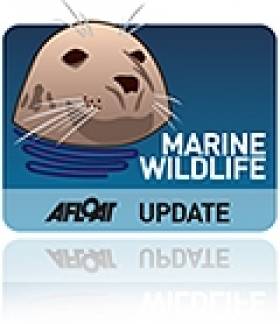Displaying items by tag: Marine Institute Naval Service
Satellite-Linked Tagging of Porbeagle Sharks
Scientists at the Marine Institute, Galway, are working with anglers around Ireland to study the migration and diving behaviour of porbeagle sharks (Latin name - Lamna nasus) in the northeast Atlantic. Porbeagle sharks are one of the top marine predators around Ireland, but very little is known about their movement patterns in the northeast Atlantic.
Like most pelagic sharks around the world, the porbeagle shark is vulnerable to fishing pressure due to its high commercial value, slow growth rate and complicated reproductive cycle. However, there is currently no protective legislation for the species, primarily due to a lack of basic information on its biology and ecology.
Marine Institute fisheries scientist Dr. Maurice Clarke said, "Understanding the biology and spatial ecology of the porbeagle shark is key to the conservation of the species and for establishing successful ecosystem-based management strategies in the northeast Atlantic".
To study the movement patterns of porbeagles, scientists are using pop-up satellite tags. These tags are fitted harmlessly to the back of the shark and collect information on the animals' location and depth distribution, together with data on the environment in which the sharks live. Then after nine months the tags pop-up to the surface and transmit the data to polar-orbiting satellites.
With help from expert shark angler, Peter McAuley, three tags were deployed off Downings, Donegal, in September 2008. These data have provided new insight into the migration and diving behaviour of porbeagle sharks around Ireland. One shark, a juvenile male, migrated over 2400 km to Madeira off the west coast of Morocco during the wintertime. Another shark migrated to the Bay of Biscay, a region that is considered a hotspot for other shark-like species such as albacore tuna. The results also showed that porbeagle diving behaviour is linked strongly to the day-night cycle and the monthly lunar cycle.
Daragh Brown of BIM commented that, "These results are really interesting and since there isn't a whole lot known about porbeagle behaviour or habitat preference, even small amounts of data can really advance our knowledge".
This year, Marine Institute scientists are hoping to tag large adult females to find out the location of porbeagle birthing grounds. Currently nothing is known about where these large predators give birth.
The Marine Institute is currently working with the Irish Elasmobranch Group, French Research Institute for Exploration of the Seas (IFREMER), and the Association for the Conservation of Sharks (APECS) to find further funding for the project that will end in 2011. They aim to establish links between the fishing industry, recreational anglers and the public to increase research and awareness for the conservation of these sharks.
Dr. Edward Farrell (Irish Elasmobranch Group) said, "Pelagic sharks have received much global attention recently. Given the increasing pressures that threaten their survival, there is a pressing need for new research to underpin effective management measures".
Marine Month Launched in Galway
The calendar of events for Galway’s forthcoming Month of Marine Madness was launched today (Monday 19th April 2010) by Deputy Mayor Peter Keane at Salthill beach with the organisers of the event, who were showcasing a number of marine-related family fun events, activities, lectures and presentations being organised in Galway throughout the month of May.
“With the Atlantic ocean at its doorstep, Galway City has a strong marine heritage and a vibrant community of anglers, sailors, fishermen, divers, scientists, conservationists and many more enthusiasts involved in the marine” Deputy Mayor Peter Keane said. “The Month of Marine Madness offers children and adults a wonderful opportunity to share, learn and participate in hobbies and interests involving the sea”.
“We look forward to a busy month of beach safaris, beach cleans, walks and talks and presentations all leading up to World Oceans Day jointly sponsored by the Marine Institute where Bjorn the Polar bear will be making his return to Galway Atlantaquaria” said Dr Noirin Burke, Education officer with the Explorers schools outreach programme. “There’s an exciting line up of activities during May for all the family.”
Galway’s Month of Marine Madness is supported by the Galway City Council, the Marine Institute, Western Regional Fisheries Board, RNLI, NUI Galway, DERI / Galway Education, Galway Bay Sailing Club, GMIT, IWDG and the Galway Dive Club”
A full programme providing details of each event is available on www.www.nationalaquarium.ie and www.explorers.ie
If you have an activity, event or presentation about the marine that can be included in the programme please contact Colette Lavin at Galway Atlantaquaria email: [email protected] All ideas welcome.































































